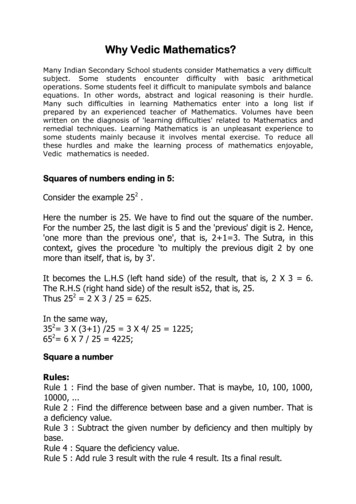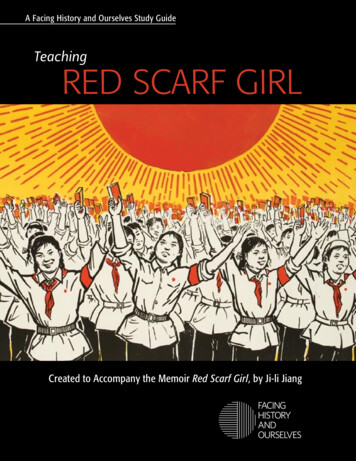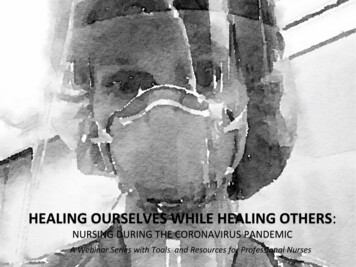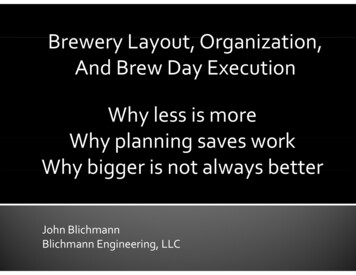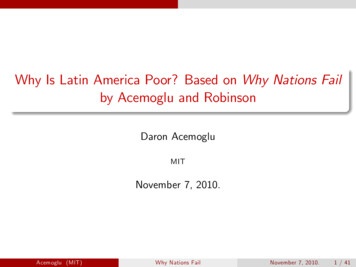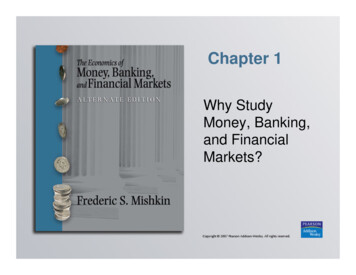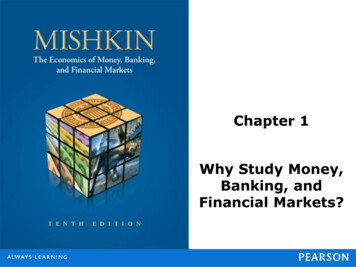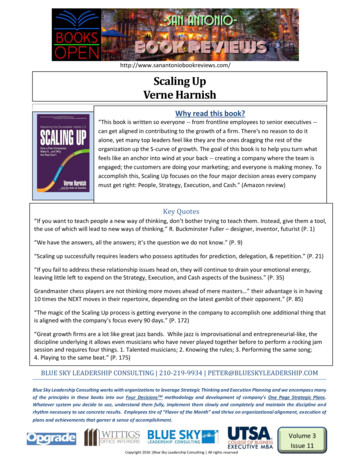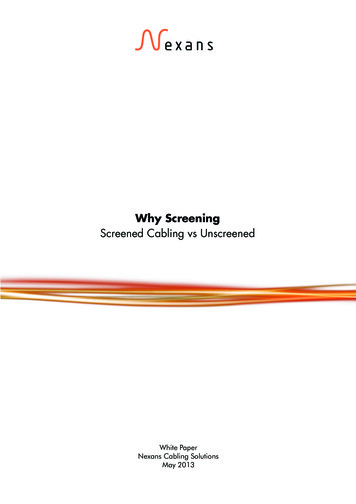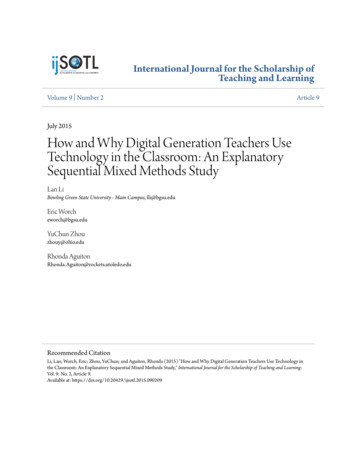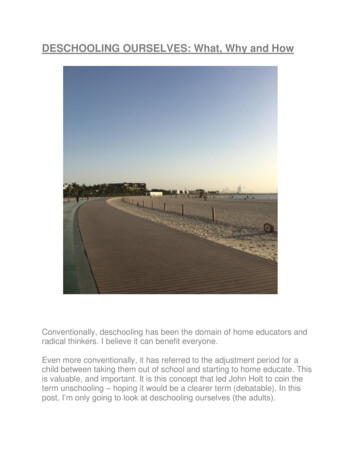
Transcription
DESCHOOLING OURSELVES: What, Why and HowConventionally, deschooling has been the domain of home educators andradical thinkers. I believe it can benefit everyone.Even more conventionally, it has referred to the adjustment period for achild between taking them out of school and starting to home educate. Thisis valuable, and important. It is this concept that led John Holt to coin theterm unschooling – hoping it would be a clearer term (debatable). In thispost, I’m only going to look at deschooling ourselves (the adults).
I will give detailed, but also relatively succinct, information on whatdeschooling is, why do it and how to go about it. It is by no means adefinitive account (that might be a book! In like, 10 years’ time!), nor is itpersonalized to you – pick and choose the bits that work for you, and lookdeeper for what is missing.Deschooling, definedWhat is deschooling and how do we define it? Many people have written onthis, so I will offer up several opinions and theories, and link to things youcan read, listen to and watch to take you deeper.As far as I’m concerned, deschooling is the process of beginning toquestion the “education” we have received growing up and living in theworld – from our families, friends, communities, school, society at large andonline platforms.
It is a journey, not a destination. You are always deschooling, you arenever deschooled. It is a dynamic process that shifts its focus and goesbeyond the thinking and questioning stage, to a place where you start towork out how you want to live, and what you’d like society to look like.It is a chance to heal and reparent yourself, work on your relationship toyourself and others in your life, re-discover your own potential. It is achance to find different ways to relate to your children and other people inyour life that are compassionate, authentic and non-hierarchical.The person who coined the term deschooling was Ivan Illich, in his bookDeschooling Society, published in 1971. He claimed that schools, based onan antiquated system, were responsible for perpetuating a “schooled”mentality whose ultimate aim was obedient, unquestioning workers.Whether you agree with this original view or not, I think deschooling can bea lot broader and far-reaching than that, both on an individual and societallevel, as well as more nuanced, and supportive of school transformationrather than abolition, as Illich advocated.Deschooling, what on earth is itDeschooling is ultimately all-pervasive and on-going to it’s quite hard to pindown. And it can be very personal. In the end you will have to pick andchoose the bits that serve you.Here are some things others have said about it.“Deschooling is the work of adjusting to a new reality, one in which a youngperson now possesses an extremely high level of freedom and acorrespondingly high level of responsibility” Blake Boles, Why are you stillsending your kids to school?“I define [deschooling] as shedding the programming and and habits thatresulted from other people’s agency over your time, body, thoughts andactions.” Akilah S. Richards, Raising Free People
Deschooling is “an intentional time to forgo any formal studies and giveyour child time to rediscover the love of learning, as they did when theywere little” Ainsley Arment, The Call of the Wild & Free (this quote alsoapplies to us adults!)John Holt on what a deschooled society would look like: “It would be asociety in which there were many paths to learning and advancement,instead of one school path as we have now . . . a path far too narrowfor everyone, and one too easily and too often blocked off from thepoor”“Education is a compulsory, forcible action of one person upon another forthe purpose of forming a man such as will appear tp us to be good; butculture is the free relation of people, having for its basis the need of oneman to acquire knowledge, and of the other to impart that which he hasacquired. Education is culture under restraint. Culture is free.” Leo Tolstoy“Deschooling demands egalitarian relations between parent and kids – afamily organization which accommodates the radical curiosity of childhood,even (perhaps especially) when it challenges authority. Parenting, in thedeschooling family, becomes a revolutionary activity.”And.“Deschooling aspires to develop not only the free individual, but ultimately afree society” Geraldine & Gus Lyn-Piluso“Colonisation works to bring us all into line. It insists that there is oneknowledge stream, one way of doing things, one value system forunderstanding success. It enforces this agenda to the detriment of allancestral knowledge, all other ways of knowing and doing, and leaves uswith a narrow vision of what life is and can be. An education that does notactively dismantle this process perpetuates systems of oppressionthroughout the rest of society.” Adele Jarrett-KerrDeschooling, why do it
I.The biggest reason why you should start on a deschooling journey, isbecause IT IS FOR EVERYONE.It is especially for those who don’t think they need it.It is for school-going families AND home educators. For anyone who worksfor an organization or institution of any kind. For anyone who has ever feltdiminished or put-down as a child or adult. For anyone who has feltoppressed, or is part of an oppressed or marginalized group, or has beenthe cause of oppression. For anyone who calls themselves a leader,teacher or parent. For anyone who has anything to do with children, in anycapacity.
II.It is not only about school. School is and was a huge part of most people’slives – so processing that and understanding the powerful dynamics at playare important. But, it is absolutely not limited to school.Everyone’s deschooling journey will be different.III.Deschooling is about questioning hierarchical structures of power, and theinfluence they wield on our lives. You may start with the adult-childrelationship and the concept of adultism, and then find that this samedynamic is replicated in so many other spheres. Deschooling is aboutcalling out and tackling oppressive systems, beginning (but definitely notending) with your relationship with your child(ren).IV.It is about healing ourselves – from our childhoods, from trauma, frominfluences that may have been less than positive or constructive in ourlives. With this, comes the realization that until we have started loving andaccepting ourselves, it will be virtually impossible to practice unconditionallove and acceptance with our children (and others, for that matter.)V.It is about relationships – the one with your children, but also the ones withpartners, friends, family members and the wider community. What,ultimately, matters more than this?VI.Deschooling is ultimately about re-imagining what we would like the worldto look like. I know, huge. But that is literally how big this is. It’s political,and it matters.
Deschooling, how to do itThere is no ‘how-to’ in deschooling, but this is more or less how I approachit.First, the intellectual part.Read some booksHow children learn, John Holt (I recommend all his books!)Inner Child Journeys, Robin Grille (also his book Parenting for a PeacefulWorld)
Changing our Minds, Naomi FischerEverywhere all the Time: A New Deschooling Reader, Matt HernRaising Free People, Akilah S. RichardsParenting from the Inside Out, Daniel J Siegel and Mary HartzellUnconditional Parenting, Alfie KohnUntigering, Iris ChenDaring Greatly, Brene Brown(this last one, and all Brene Brown’s books, are not really about educationbut a lot of the concepts in her books have helped me see myself andothers differently, and ultimately informed my deschooling process).When Things Fall Apart & The Places that Scare You by Pema Chodron(and all of her books!). and some articles & blogsThe School WoundUnschooling for decolonizationReparentingDeschooling 101 (by me!)Carol Black’s essaysPeter Gray’s columnRacheous blog
Happiness is here – if you are home educating, I highly recommed this blogand Sarah’s Instagram accountListen to some good chats.Grounded Families podcast – I loved the episodes with Eloise Rickman,Nicola Rae-Wickam and Sas Petherick but they are all so valuable, andevery time I listen I come away with new inspirationThe Unschool Space on DeschoolingFare of the free child podcast (all episodes are worth a listen!)Revillaging podcastOff-trail learning podcast (also all episodes)Watch some juicy videosLife without school Youtube channel:https://www.youtube.com/watch?v m-I0Tctm 8Ehttps://www.youtube.com/watch?v aJuIcZAqyO4Kristin Folts TedX talk on inner child healingSir Ken Robinson’s TED talkLiz Gilbert TED talkAre you sold yet?
Now is the hard part – the processing, healing and practicing part.Also, the most revolutionarily beautiful part of all.This part is in your hands. It is a long, mostly slow journey. And it is soworth taking.There is no one way to do it, in fact there are infinite ways to go about it. It’sgoing to look different for everyone.I’m only going to speak about ways I have approached this personally,because it’s all I can genuinely speak on.GET HELP
Inner Child journeys and reparenting. Consider seeing a therapist,counsellor or healer if you think it might help to process. I have atseveral moments in my life. Start or join a group you can lean on. Find someone who you trustthat can hold you accountable without shame or blame. Share withfriends and family. Community is important, most of us can’t do thisalone. Take a course. For unschooling I highly recommend LucyAitkenread’s DISCO course. Eloise Rickman offers wonderfulparenting and education courses. Figure out who you are. Staying true to myself – I realized aftercancer that I had not done that, for such a long time (if ever). The firststep was figuring out who I actually was, what I genuinely wanted andneeded, and what I didn’t. I loved Elizabeth Gilbert’s book Big Magic.I also needed the help of people – friends, therapists, writers andthinkers, my husband and my children. We can’t do this alone. Meet courage, fear, vulnerability and shame – Brene Brown writes alot about this (her quote below). These are big themes for me, theymay not be for you. We talk about these openly with our children.
MAKE TIMECreate new habits. Following joy – finding joy in small things; making joy, rather thansuccess and productivity, an integral part of every day. Journaling & writing: this is the way I express myself best, the way Ifigure things out. Yours might be something else entirely – painting,movement, time alone, time around others. Make time for whatever itis that helps you figure things out. Start a regular practice that helps you stay focused and grounded.Some things I have tried are: meditation, yoga, running, long walks,
being out in nature, affirmations, just a few minutes alone with nodistractions. Praying (the secular kind). I’m not a praying person, like, at all. Butone extremely challenging day, I found myself summoning thestrength to get through it, from somewhere – anywhere! So I came upwith my secular prayer idea. I write this myself, and it’s alwaysevolving/changing. As soon as I wake up, I pick up my notebook andtake a minute to slowly read this out to myself. It has helped. Radical self-love. This is not self-care, it is re-learning how to speakto and treat yourself in an unconditionally loving way. It takes timeand conscious, daily awareness and effort. Rest – rest is radical. We are told we must be doing, producing, andbusy all the time. If you’re not busy there must be something wrongwith you. Making time for rest is nothing short of revolutionary. Boundaries – Brene Brown writes eloquently about this. I’ve beenworking on expressing my boundaries in terms of my needs, ratherthan as limits that exist independently of me, and owning them.Boundaries are okay – we all have them, because we all have needs!It’s time we honoured them. Learning to express my needs has beencrucial (I loved Non-Violent Communication – it works for me, but Iknow there are issues with the method when it is championed as aone-size-fits-all method, or “the only way”. It is neither of thosethings.) Stop caring what everyone thinks, and start caring what a select fewpeople think. I listened to The Subtle Art of Not Giving A F*ck by MarkManson, it was fun and interesting) Make a commitment to your children: I wrote mine a pledge, and theyare fully aware of what we are trying to do as a family, and as suchthey are invested in it, and hold me accountable. They also know thatthere will be struggles and failure, and that’s okay. Make time to talkabout these things openly; ask questions, solicit feedback, expressfeelings.
Keep learning. I actively work to give back power to my children, and let go ofcontrol. A great book if you’re starting off is The Self-Driven Child byNed Johnson and William Stixrud. It’s mainly aimed at school-goingfamilies and in my opinion, it doesn’t go far enough, but it’s a greatstart. If you’re a bit further into deschooling, try Anarchist Pedagogiesed. Robert H. Haworth Start learning again – is there something you’ve always wanted tolearn but never got around to? Or never found a compelling reasonto? Now’s the time. Do it just because. Anti-racism and decolonization work. I am not the person to speak onthis, but if you are white, I believe it is important to tackle this stuff.There are several Instagram accounts I would hild/https://www.instagram.com/hood ayracism bromeed/ Fuck Beauty Standards. This is a big one for me, and I have only justbegun scraping the surface of this. I enjoyed Bad Feminist by RoxaneGay a while back. Start questioning the things you do to conform towhat we’ve been told is desirable. Practice mini acts of rebellion, that
defy these things. Learn more about Feminism – I’m currently on anreally inspiring Feminist Summer Camp!REIMAGINE Re-image education – my focus is on normalizing home education,and also normalizing the concept of learning spaces that are notschool, but are accessible to everyone. I also want to campaign fortransformation in schools but I’m still figuring how to go about this. Ithas helped me to find a cause or purpose, and follow it, ever soslowly. Rethink Capitalism – start to reframe a lot of what we believe and doas a product of our economic system. This can be confronting,especially if you have benefited from capitalism (which, let’s face it,many of us have). Rethinking concepts of freedom, autonomy, what it means to livecommunally – I read a lot of political philosophy at university, and Ilove talking and thinking about this stuff. Recently I’ve been listeningto Talking Politics, History of Ideas podcast. Loads of food forthought.GIVE BACK Normalise that what you are doing (raising children) is valuable andimportant. The way you do it matters. Raising and educating childrenis political. Beyond my own family, it has helped me to make lists of things I canactually do to make a difference, however small. I get easilyoverwhelmed by the every-changing news cycle, and to avoidparalysis I prefer to jump in and figure out what I can actually do tohelp, however small (and it always, inevitably, feels small). Things
like donations (if you can, make a list of organisations you willregularly donate to), spreading the word, volunteering time orresources, writing to local and national representatives, signingpetitions, talking to friends and families about the issues you careabout.There is so much more, and I could go on.Can you add to this list?What will you be doing to deschool & heal yourself?I’d love to hear. Thanks for reading and come find me @bigmothering
Parenting from the Inside Out, Daniel J Siegel and Mary Hartzell Unconditional Parenting, Alfie Kohn Untigering, Iris Chen Daring Greatly, Brene Brown (this last one, and all Brene Brown’s books, are
